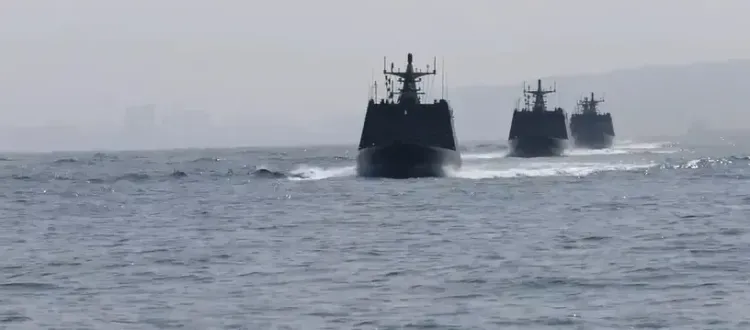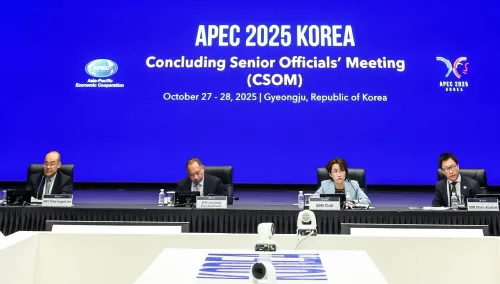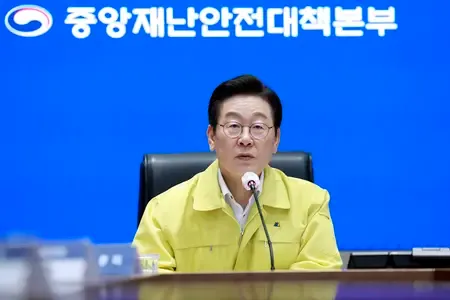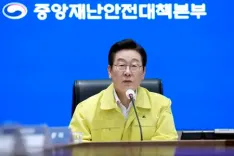Taiwan Warns of Regional Instability Due to China's Military Activities

Synopsis
Key Takeaways
- Taiwan condemns Chinese military drills as destabilizing.
- 19 Chinese naval ships were detected near Taiwan.
- Taiwan's military is on alert and monitoring the situation.
- US and Japan reaffirm commitment to peace in Taiwan Strait.
- China's actions are seen as a challenge to international order.
Taipei, April 1 (NationPress) Firmly denouncing the recent military exercises conducted by China in proximity to Taiwan, Taipei asserted on Tuesday that Beijing's aggressive actions are jeopardizing regional stability.
This statement follows the detection of 19 Chinese naval vessels operating around Taiwan on Tuesday morning.
The Taiwanese Ministry of National Defence criticized this activity, labeling it a disruption of the status quo, and indicated that it has mobilized military ships and aircraft in response to these threats.
"On Tuesday morning, we detected 19 Chinese naval ships in the vicinity of Taiwan. The Armed Forces of Taiwan are actively monitoring the situation and have deployed CAP aircraft, naval vessels, and coastal missile systems in response to these detected movements," the defence ministry disclosed.
The Taiwanese Ministry of Foreign Affairs urged China to halt its destabilizing actions that threaten the established order and peace in the Indo-Pacific region, describing them as reckless conduct.
In a post on X, the ministry stated, "We categorically condemn China's joint military exercises near Taiwan. The Chinese Communist Party's provocations from the East and South China Seas to Oceania pose a risk to regional tranquility. We call on Beijing to cease its actions that undermine the status quo and peace in the Indo-Pacific region."
Moreover, the defence ministry reiterated Taiwan's commitment to the principle of avoiding conflict escalation and not provoking disputes, while responding wisely to grey-zone harassment to protect national sovereignty and the safety of its citizens.
These military drills occurred shortly after US Secretary of Defense Pete Hegseth's visit to Taiwan, following engagements in Japan and the Philippines, where he voiced criticism of China and emphasized Japan's role in addressing Chinese aggression.
According to Taiwan's leading newspaper, Taipei Times, an official commented, "Taiwan serves as their primary pretext. It is no coincidence that they initiated such military exercises right after the departure of the US defense secretary from Asia."
Earlier on Tuesday, the defence ministry reported that PLA Navy vessels, including the aircraft carrier Shandong, were observed from March 29 and had entered Taiwan's response zone. The ministry affirmed that Taiwanese forces have been tracking the situation and responding appropriately.
The statement from the ministry highlighted that China is continuing to escalate its military presence in the Taiwan Strait and the Indo-Pacific region, intensifying military threats and challenging international norms and regional stability, thereby earning the label of the greatest “troublemaker” in the view of the global community.
China has also acknowledged that it is conducting cooperative army, navy, and rocket drills around Taiwan.
In a provocative move, Beijing referred to Taiwan's President Lai Ching-Te as a “parasite”.
Meanwhile, on Monday, the US and Japan reaffirmed their dedication to maintaining peace in the Taiwan Strait and their opposition to Chinese coercion in the East China and South China Seas following a meeting between US Secretary of Defense Pete Hegseth and Japanese Defence Minister Gen Nakatani.
Taiwanese Foreign Minister Lin Chia-lung welcomed this support, stating that the nation values its democratic allies in the context of a free and open Indo-Pacific.
Last month, Taiwanese President Lai had characterized China as a “foreign hostile force” and escalated national security measures in response to rising threats and a series of espionage incidents.
China asserts that Taiwan is a part of its territory that must be unified with the mainland, even by force if necessary. In recent years, Beijing has ramped up military exercises in the Taiwan Strait as a means of exerting pressure on Taiwan.
Meanwhile, the US and its allies view the Taiwan Strait as an international waterway, routinely sending warships through the strait to assert their influence in the Indo-Pacific and counteract China's growing dominance.









